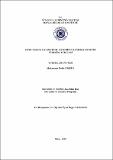Please use this identifier to cite or link to this item:
http://hdl.handle.net/11547/2445Full metadata record
| DC Field | Value | Language |
|---|---|---|
| dc.contributor.author | Coşkun, Muhammet Fatih | - |
| dc.date.accessioned | 2019-06-22T10:48:54Z | - |
| dc.date.available | 2019-06-22T10:48:54Z | - |
| dc.date.issued | 2019 | - |
| dc.identifier.uri | http://hdl.handle.net/11547/2445 | - |
| dc.description.abstract | İç kontrol, birçok ulusal ve uluslararası çalışma ve düzenlemelere konu olmuştur. Bu çalışmaların en önemlilerinden biri ‘‘COSO İç Kontrol Modelidir’’. Bu iç kontrol modeli, 1992 yılında Treadway Komisyonunu Destekleyen Kuruluşlar Komitesi (COSO) tarafından ‘‘İç Kontrol Bütünleşik Çerçevesi’’ adlı raporda yayımlanmıştır. COSO iç kontrol modeli, iç kontrol kavramı için ortak bir anlayış ve kapsayıcı bir çerçeve oluşturulması amacıyla geliştirilmiş gönüllü bir iç kontrol rehberidir. COSO iç kontrol sistemi, işletmenin üst yönetimi, yönetim kurulu ve diğer personeli tarafından etkilenen; faaliyetlerin etkinliği ve verimliliği, raporlamanın güvenilirliği ile yasa ve düzenlemelere uyum hedeflerine ulaşılması konusunda makul güvence sağlamak üzere tasarlanan ve yürütülen bir süreçtir. COSO İç Kontrol Bütünleşik Çerçevesi, iç kontrolün tasarlanmasını, uygulanmasını ve yürütülmesini içeren, iç kontrolün etkinliğini değerlendiren ve günümüzde uluslararası ölçekte kabul gören bir iç kontrol çerçevesi haline gelmiştir. Günümüz işletmelerinin faaliyetlerini belirledikleri hedefler doğrultusunda gerçekleştirebilmeleri ve finansal tablo kullanıcılarına doğru ve güvenilir bilgiler sunabilmeleri için işletme yapılarına iç kontrol sistemini kurmaları ve etkin bir şekilde yürütmeleri büyük önem arz etmektedir. Bağımsız denetçi açısından iç kontrol sisteminin değerlemesi, denetim çalışmalarının tamamlanması açısından çok önemlidir. Bağımsız denetçi, iç kontrol sisteminin mevcut durumuna göre çalışmalarını şekillendirmektedir. Bu çalışmada iç kontrolün etkinliğine yönelik dünyada en çok kullanılan iç kontrol çerçevesi olan COSO İç Kontrol Bütünleşik Çerçevesi temel alınmıştır. Bu doğrultuda COSO modeli ile yapılandırılmış iç kontrol sisteminin işletme yapılarına ve bağımsız denetim sürecine etkilerini tespit etmek amacıyla nitel bir araştırma yapılmıştır. | tr_TR |
| dc.language.iso | tr | tr_TR |
| dc.publisher | İSTANBUL AYDIN ÜNİVERSİTESİ SOSYAL BİLİMLER ENSTİTÜSÜ | tr_TR |
| dc.subject | İç Kontrol Sistemi | tr_TR |
| dc.subject | COSO | tr_TR |
| dc.subject | İç Kontrol Bütünleşik Çerçevesi | tr_TR |
| dc.subject | Bağımsız Denetim | tr_TR |
| dc.subject | Internal Control System | tr_TR |
| dc.subject | COSO | tr_TR |
| dc.subject | Internal Control Intagrated Framework | tr_TR |
| dc.subject | Independent Audit | tr_TR |
| dc.title | COSO TABANLI İÇ KONTROL SİSTEMİNİN BAĞIMSIZ DENETİM SÜRECİNE ETKİLERİ | tr_TR |
| dc.type | Thesis | tr_TR |
| dc.description.abstractol | Internal control has been discussed many national and international studies and regulations. One of the most important of them is the “COSO Internal Control Model”. This internal control model was published in the report titled “Internal Control Integrated Framework” by Committee of Sponsoring Organizations of the Treadway Commission (COSO) in 1992. COSO internal control model is a voluntary internal control guidance developed to provide a common understanding and a comprehensive framework for the notion of internal control. COSO internal control system which is a process affected by the senior management, board of directors and other personnel of the organization is designed and implemented in order to provide reasonable assurance in terms of the efficiency and productivity of the activities, reliability of the reporting and of whether the objectives of being in compliance with laws and regulations are fulfilled. The COSO Internal Control Integrated Framework has become an internationally recognized internal control framework today, which includes the design, implementation and execution of internal control, and assesses the effectiveness of internal control. It is of great importance for today’s enterprises to establish an internal control system in their business structures and conduct it effectively in order to be able to carry out their activities in line with the goals they have set and to offer accurate and reliable information to the users of financial statements. Valuation of the internal control system for the independent auditor plays a significant role in the completion of auditing process. Independent auditor shapes his/her work according to the current state of the internal control system. In this study, COSO Internal Control Integrated Framework, which is the most widely used internal control framework in the world for to the efficiency of the internal control was considered. In this respect, a qualitative research was carried out to determine the effects of the internal control system structured with the COSO model on the enterprise structures and the independent audit process. | tr_TR |
| dc.publisher.firstpagenumber | 1 | tr_TR |
| dc.publisher.lastpagenumber | 152 | tr_TR |
| Appears in Collections: | E-books | |
Files in This Item:
| File | Description | Size | Format | |
|---|---|---|---|---|
| 10244826.pdf | 1.43 MB | Adobe PDF |  View/Open |
Items in DSpace are protected by copyright, with all rights reserved, unless otherwise indicated.
